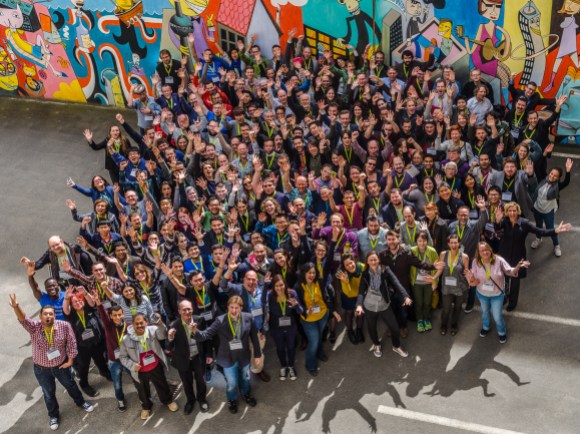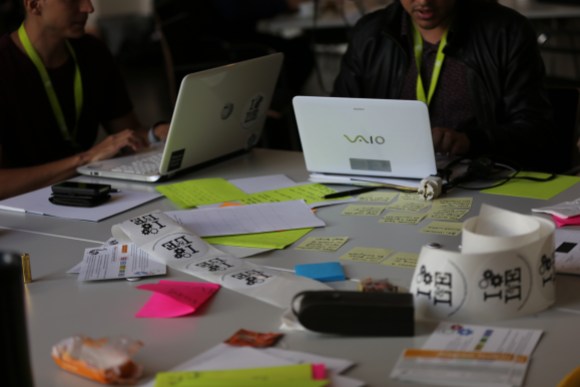
For the third straight year, the Wikimedia Conference was preceded by pre-conference Learning Days for affiliates that want to improve their skills in community engagement, program design, and evaluation. The training pre-conference in Berlin was organized by the Learning & Evaluation team in collaboration with Community Engagement teams and dedicated to providing program capacity development resources and opportunities for community leaders. This year the two Learning Days, held April 21-22, were a highlight for many of the 51 community participants as well as various foundation staff who lent their presence and support for learning exchange, they said in their feedback afterward. Through workshops, panels and presentations, these two days condensed a collaborative platform for program leaders to learn from each other, harvest resources and enhance skills on four priority themes: engaging and retaining volunteers, exchanging best practices, designing Wikimedia programs and events, and measuring and evaluating impact.
Being a predominantly online and diverse community, the individual affiliates that in one way catalyze the growth of the movement face several challenges. Many of these challenges are unique and most of them come with a great amount of learning. Designing Learning Days involves creating a spectrum of lessons learned and sharing them among the leaders. While the main conference works as an avenue for high-level discussions, the Learning Days are meant for more granular understanding of the affiliates and building relations for more engagement in the future.
In order to ensure coverage of most relevant issues for program leaders and best support their work, topics for Learning Days themes were chosen based on the votes of participants when they signed up for the pre-conference. This was the first year Learning Day applications were integrated into main conference registration, and the interest in taking part was shown by the numbers: 133 (76%) of conference participants indicated their interest in participating in the Learning Days; 52 (30%) of those were “very interested” and 81 (46%) “somewhat interested”.
There were four major areas that surfaced as most important; 1) Engaging and retaining volunteers (participatory engagement strategies, communications and social media), 2) Best practice exchanges with other leaders (lightning talks, creative problem solving), 3) Designing Wikimedia programs and events (program toolkits, creative program design, workshop design), and 4) Measuring and evaluating impact (logic models, outcome mapping, data analysis and metrics).

Sessions were organized in three types: a) learning exchanges (lightning talks, tools rotations, unconference breakouts); b) training workshops, and; c) plenary sessions (general orientations, reflections); and held in two differently designed rooms to suit the session type.
Lessons learned, from Wikimedian to Wikimedian
In order to promote peer-to-peer learning, program leaders are encouraged to engage in three different ways: submitting a poster, presenting a lightning talk or co-hosting a workshop. These Learning Days had the highest participant engagement rate thus far. On this occasion there were 19 participants who shared lightning talks, 9 who shared poster presentations, and 10 who helped to co-host a workshop.
Out of the total 51 participants, 31 (60%) contributed in sharing feedback in all sessions about what they liked the most from the sessions, wanted to improve in the future, and what they were planning to do in the next 30 days. Learning from others was one of highest appreciated values of Learning Days, as observed in end-of-day plenaries as well as from the analysis of feedback forms. Some of the quotes that highlighted this include “Learning from other groups’ experiences – some ways to engage and retain volunteers and prevent burn-out” and “Kaarel [a community member]’s presentation was awesome and got me motivated. Other speakers also resonated with me.”
The Learning & Evaluation team came up with a new structure for the evaluation form which was used to collect feedback and next steps for program leaders on individual sessions. The evaluation form itself was also useful, participants said, as they noted their time to reflect on what their most important learning was and consider the next steps they should take to apply it.
You can read more about the outcomes and find the presentations and handouts shared on the Outcomes section of the event page on Meta.
Looking ahead
How are participants going to apply the skills gained during Learning Days in the near future? An analysis of the feedback forms reveals that, in the next 30 days, program leaders hope to spread these capacities in two different ways: bringing back processes to their local communities, and applying tools and resources to their projects.
As we continue to support communities and develop capacities with leaders that act on the local level, we are working to prepare our next Learning Days at Wikimania 2016, in Esino Lario, Italy. We are now in the process of inviting program leaders to take part. If you are coming to Wikimania and would like to take part in these next Learning Days and have not received an invitation, please email evalwikimedia.org and tell us more about your interest in participating.
The Learning and Evaluation team is very grateful for all those who engaged in giving feedback, as this evaluation process continues to help us better design our future Learning Days.
We are happy to be part of a movement that is learning together. Don’t forget to share what you learned through a Learning Pattern, and spread the word about any new resources on our Facebook group or Twitter handle. Keep the learning wheel rolling!
Subhashish Panigrahi, Communications Contractor
María Cruz, Communications and Outreach Coordinator, Learning and Evaluation team
Jaime L. K. Anstee, Senior Strategist (Program Evaluation)
Wikimedia Foundation

Can you help us translate this article?
In order for this article to reach as many people as possible we would like your help. Can you translate this article to get the message out?
Start translation